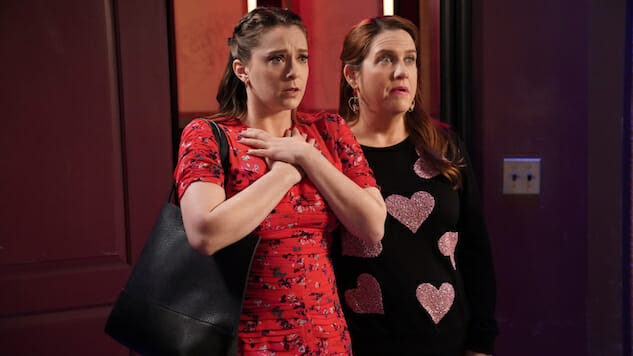Crazy Ex-Girlfriend Was Worth Going Crazy For
Photo: Greg Gayne/The CW
It may be no more than a measure of the times—in culture, in politics, and most definitely on television—but it’s always struck me as significant that Crazy Ex-Girlfriend’s finest hour is its scariest, its thorniest, its most self-aware. In “Josh’s Ex-Girlfriend Is Crazy,” the first episode to cop to the tongue-in-cheek title’s kernel of truth, our heroine, Rebecca Bunch (series co-creator Rachel Bloom), exacts revenge on her ex-fiancé, Josh (Vincent Rodriguez III), for leaving her at the altar. This being Crazy Ex-Girlfriend, the Swimfan-inspired fantasy features broadly funny goofs on the horror genre—spooky lighting, foreboding fog, noises at the window and glances beneath the bed—not to mention wry commentary on Rebecca’s warped logic: As the guileless Dane at her hostel remarks, “Josh is more a symbol of effortless normalcy from which you always felt excluded.” It’s the episode’s subtle departures, though, that produce shivers of fear. After all, Josh isn’t the immediate catalyst for Rebecca’s unwinding. It’s her friends. When Paula (Donna Lynne Champlin), Darryl (Pete Gardner), Heather (Vella Lovell), and Valencia (Gabrielle Ruiz) turn up at Rebecca’s apartment for an impromptu intervention as she’s about to jet off to Rome with her new love interest, Nathaniel (Scott Michael Foster), she goes on the offensive, aiming a fusillade of vicious insults at everyone in the room. In the course of four seasons, Crazy Ex-Girlfriend comes no closer to drawing blood than this. “You’re all traitors,” she spits, and it has the same chastening finality of burning down a house.
Except it doesn’t. Approaching the “rock bottom” of Crazy Ex-Girlfriend’s most ambitious arc, which culminates in Rebecca’s attempt on her own life and subsequent diagnosis with borderline personality disorder, the most radical feature of “Josh’s Ex-Girlfriend Is Crazy” is that it isn’t final—not even, it turns out, for Rebecca and Josh. In this, the series’ wildly surprising, dark-hearted masterpiece, which (literally) brings Rebecca to the edge of the abyss, is no departure at all: From the start, Bloom and co-creator Aline Brosh McKenna’s musical comedy has focused its manic energies on the nature of change, on the characters’ halting steps forward and inevitable steps back, and it has never lost faith in the promise that change is possible. Even on the cusp of Rebecca’s nadir, the series hews to its belief that none of us are bound by the stories we’ve told ourselves, or by the people we’ve been, at least on a long enough timeline. “Life is a gradual series of revelations / That occur over a period of time,” Josh Groban sings with the montage of fretful faces that closes “Josh’s Ex-Girlfriend Is Crazy.” “It’s not some carefully crafted story / It’s a mess and we’re all gonna die.”
If Crazy Ex-Girlfriend hasn’t sustained the brilliance of “Josh’s Ex-Girlfriend Is Crazy” and its immediate aftermath, it’s not simply because such a tonal high-wire act—a black comedy about mental illness, with songs!—is nigh impossible to pull off for long. It’s also a function of the series’ central insight about change: It might come out of life’s largest dramas, its great successes and cruel reversals, but ultimately it’s an ongoing process, occupying the stretches in which we aren’t spiraling down or flying high. As I wrote shortly after “Josh’s Ex-Girlfriend Is Crazy,” Crazy Ex-Girlfriend’s next act has embraced its supporting characters’ sense—set off by Rebecca’s tirade—that they, too, have some changing to do, and that Rebecca’s problems had become an excuse for failing to confront their own. The result, the last stage in the series’ evolution from questionable premise to sterling rom-com to the best TV musical since the near-perfect first season of Glee, is not as taut, or as tart, as the Crazy Ex-Girlfriend of iterations past. Instead, it is expansive, relaxed, forgiving in the way of old friends and faded jeans. As Rebecca rushes ahead in her treatment only to land on her ass; as Paula finishes law school and passes the bar; as Heather finds purpose, Valencia finds love, and Darryl finds another shot at fatherhood, new challenges emerge, to be met this time around with the hard-earned wisdom of what’s come before. Per Groban’s point—and per tonight’s series finale—this may not be as satisfying as the grand epiphany, the tidy ending, the 11 o’clock number, but it is truer to life. (It also gave us the ABBA-inspired instant classic “First Penis I Saw,” a surefire pick-me-up on the dreariest day.) On the fundamental messiness of change, the series remains, to its final frames, one of the medium’s most indelible works of art.